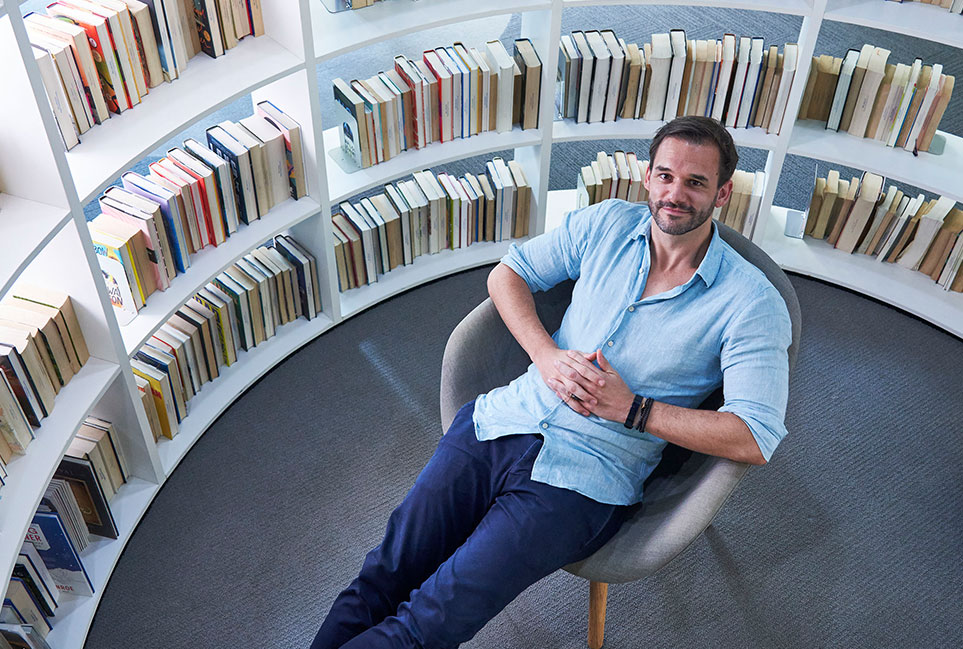
Coincidences happen in our lives every day, whether we notice them or not.
For Simon Schillebeeckx, an Assistant Professor of Strategic Management at the Lee Kong Chian School of Business (LKCSB), it was one such twist of fate that led him to Singapore and SMU.
Back in 2014, while in the third year of his PhD programme at Imperial College in London, he learned that his academic supervisor at the time, Professor Gerry George, was moving to Singapore.
Professor George, who would become Dean of LKCSB from January 2015 to June 2021, gave him just two months to finish his PhD. He was then offered the chance of going to Singapore as a postdoctoral researcher where the two men could continue working together.
The choice was an easy one for Assistant Professor Schillebeeckx.
Just six hours before that momentous meeting, the Belgium native‘s relationship had ended and felt that there was nothing necessarily tying him down to London
He made the decision there and then to accept the offer. He finished his PhD in record time and moved to Singapore in 2015.
This turned out to be a good choice. He found that he really liked it at SMU and felt very fortunate to get offered a faculty position in July 2016.
Assistant Professor Schillebeeckx has long held an interest in sustainability. He studied commercial engineering at university in Belgium, then went on to specialise in ethics and corporate social responsibility, with a particular interest in the environmental aspects of sustainability.
His foray into academia was seeded when he worked as a consultant in sustainability, specifically doing sustainability reporting, carbon audits, and process improvements. He managed to convince his CEO to allow him to design a new business vertical centred on innovation and sustainability.
Although it became a successful line of business for the company, he didn't feel like it was enough for him.
“I was pretty happy being a consultant but I was not intellectually satisfied with the consulting work I was doing,” he shared. “I found it to be too superficial and I never got enough time to really develop deep expertise into the things I wanted to become more of an expert in. So, as a consequence, I pivoted to a PhD programme.”
While Assistant Professor Schillebeeckx focussed his PhD on innovation, he was still working on sustainability questions and natural resource management. And this strand of his work has become more important in the last few years both academically and non-academically, as he also co-founded two start-ups in this area.
One of them, Handprint (the term refers to your positive impact on the planet, the opposite of a 'footprint'), connects companies to causes that align with their values, such as reforestation, coral reef construction, ocean plastic clean-ups, as well as various types of social impact.
The other is the Global Mangrove Trust, whose goal is to plant as many mangrove trees as possible, as quickly as possible, by working with local impact partners and leading teams around the world.
While his two start-ups keep him busy in addition to his career at SMU, he looks at them as both a hobby and an interest and enjoys the fact that there's an overlap. Also, the work he does with his start-ups align quite well with his academic work.
Having authored a number of articles, papers and books over the years, Assistant Professor Schillebeeckx has changed focus for his published work.
“My research interest pivoted a little bit away from the pure focus on natural resources to a stream of research that I've been developing since 2018 that really tries to integrate my interest in innovation with my interest in sustainability and natural resource management,” he explained. In a 2020 paper published in Entrepreneurship, Theory, and Practice, he and his co-author referred to this stream of research as “digital sustainability”.
Since then, his work has been published in industry reports that have been presented at Davos, and in the Monetary Authority of Singapore's publication, Macroeconomic Review, amongst others.
“I think this area of how companies use digital technologies to achieve sustainability goals or to support regeneration of natural ecosystems is going to become a much bigger area than the pure focus on managing natural resources,” he said.
“So, as an academic, that's what I'm going to be focussing on in the next couple of years and probably much longer.”
For now, Assistant Professor Schillebeeckx teaches two undergraduate courses – the design of business and an elective sustainable operations course. He describes his teaching style as “interactive” and himself as “convivial”.
“I don't try to be a very authoritative professor, I try to make it as conversational as possible but that's easier in some classes than in others,” he said. “It also depends on how much students’ willingness to engage with the topics and questions at hand. In addition, interaction in online classes is also significantly harder.”
Assistant Professor Schillebeeckx added that he was trying to turn his classes into spaces where students can feel comfortable voicing their opinions and readily responding to his questions. Being a professor who drones on for hours is something he aims to avoid.
The 38-year-old Assistant Professor and his wife welcomed twins in April 2021 and the two bundles of joy have left the new father with little time. As a colleague of his described it: having kids is like a welcome hostile takeover of your time, love, and priorities.
When he does have time to relax, the big football fan watches English Premier League matches or indulges in a Netflix binge. He also has a personal trainer whom he consults twice a week, “to force me to get out of my chair and do something active,” he said chuckling.